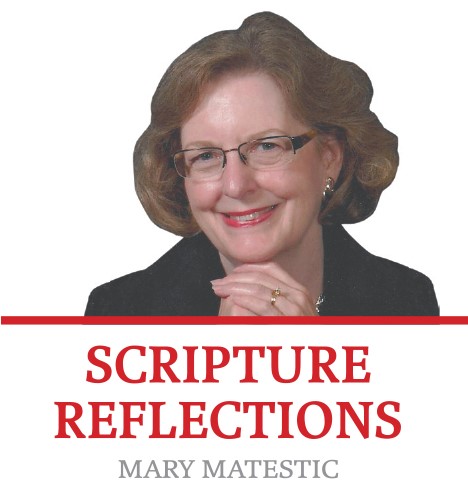Scripture Reflection: Palm Sunday, March 28, 2021
March 28, 2021
Palm Sunday
Mark 11:1-10
John 12:12-16
Isaiah 50:7
Philippians 2:6-11
Passion of Mark 14:1-15:47
Besides giving up ice cream and paying more attention to prayer each day, my Lenten resolve always pales when I come to Holy Week. These small sacrifices, considering the complete self-gift of Christ, are no comparison. And yet, I come to this week with great joy and anticipation. Some ancient love is stirred within as I meditate upon the Passion of Christ. The late Bishop Fulton Sheen has attracted me this Lent, especially his YouTube reflections upon the seven last words of Jesus. Sheen lingers at Calvary and hangs upon every word Jesus speaks through his agony. The Cross, he says, is the great pulpit of God. But I get ahead of myself.
The beginning of Holy Week offers us a preview of what is to come as we look toward the Triduum. Today, there is the triumphal entry of Jesus into Jerusalem. With palms waving and shouts of “Hosannas” filling the air, a haunting jubilance surrounds the procession. The dusty roads into Jerusalem, where Jesus will die, are covered with cloaks, like they would be for a “real” king. But Jesus is a humble king who rides upon a colt, not a warhorse. His kingdom is not of this world.
Jesus’ kingdom is demonstrated by compassion and love, by forgiveness and solidarity with the poor. Jesus’ kingdom would be marked by belief in him as Messiah. Here in the triumphal entry into Jerusalem, we understand what Paul is saying to the Philippians. On this humble colt, we begin to realize the emptying of Christ who, like a slave, is obedient even to the point of death.
This is also the time of the Passover. I cannot tell you how important this feast was (and still is) to our Jewish brothers and sisters. During the sacred rites and the Seder meal, they lived out the great Exodus from slavery into freedom. Lambs were bought and slaughtered. Their blood was spilled upon the temple altars. Stories of Moses and the desert wanderings were relived. Foods with significant meaning were eaten and the psalms of Hillel were sung. There was bread and wine and history and memory; it flowed like a river through every Jewish home in Jerusalem.
Jesus would not be left out of these sacred rites. As the week pressed on, Jesus found his way to the upper room to celebrate Passover with his 12 friends. Yet, this Passover meal was different. Jesus became the bread. Jesus became the wine. Jesus became the Passover Lamb who would be slain. And when he said, “Do this in memory of me,” he meant exactly that. To celebrate Passover for a Jew meant to live it out personally at that moment. Even today, when the Church gathers to break and eat the bread who is Christ and drink the cup of the New Covenant, we are there in the upper room with Jesus and the 12 once again. The act is the reality every time we celebrate the liturgy.
As the night fell, the hour of betrayal arrived. The images are clear. Gethsemane. Sleeping apostles. The agony of a man who so wants the cup of suffering to pass. To run away. To get lost in the woods behind the hill. Yet Jesus stayed as Judas, the soldiers, chief priests and Pharisees came with torches and weapons to arrest this dangerous man.
Love is dangerous after all. It challenges the legal systems. It compromises the status quo. It does not judge or condemn; it does not demean the darkest soul. Love changes everything, suffers everything, and finds its way to a place where one day it will prevail.
On Good Friday, the Passion heightens. Gathered with our brothers and sisters, masked and distanced, we will listen to the Passion from John’s Gospel, venerate the cross of humiliation, and sing “Were You There?” I always find arriving home sobering. Knowing that, I will probably spend time reflecting once again on how Jesus taught from the Cross. As Bishop Sheen said, “In his sublime goodness, Our Blessed Lord has left us His thoughts on dying. He calls all his children to the pulpit of the Cross, and every word He says to them is set down, for the purpose of undying consolation.” (Bishop Fulton J. Sheen; The Seven Last Words, Alba House, 1933. pp. viii-ix)
Though my Lenten penances pale, Christ’s love turns them into incense rising. For that, I am grateful.
“Father, forgive them, for they do not know what they do.” Luke 23:34
“Truly, I say to you, today you will be with me in Paradise.” Luke 23:43
“Jesus said to his mother: “Woman, this is your son.” Then he said to the disciple: “This is your mother.” John 19:26-27.
“I thirst.” John 19:28
When Jesus had received the wine, he said, “It is finished;” and he bowed his head and handed over the spirit. John 19:30
Jesus cried out in a loud voice, “Father, into your hands I commend my spirit.” Luke 2:46.

